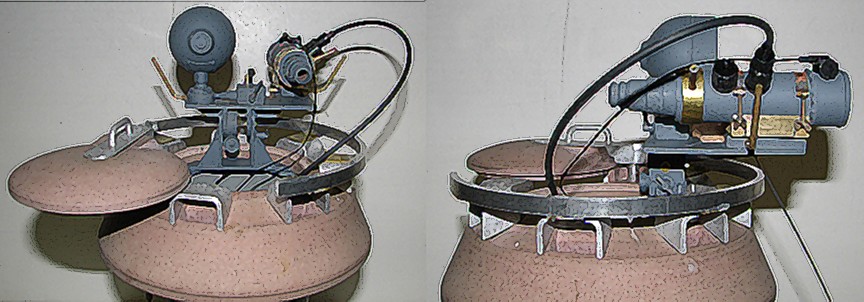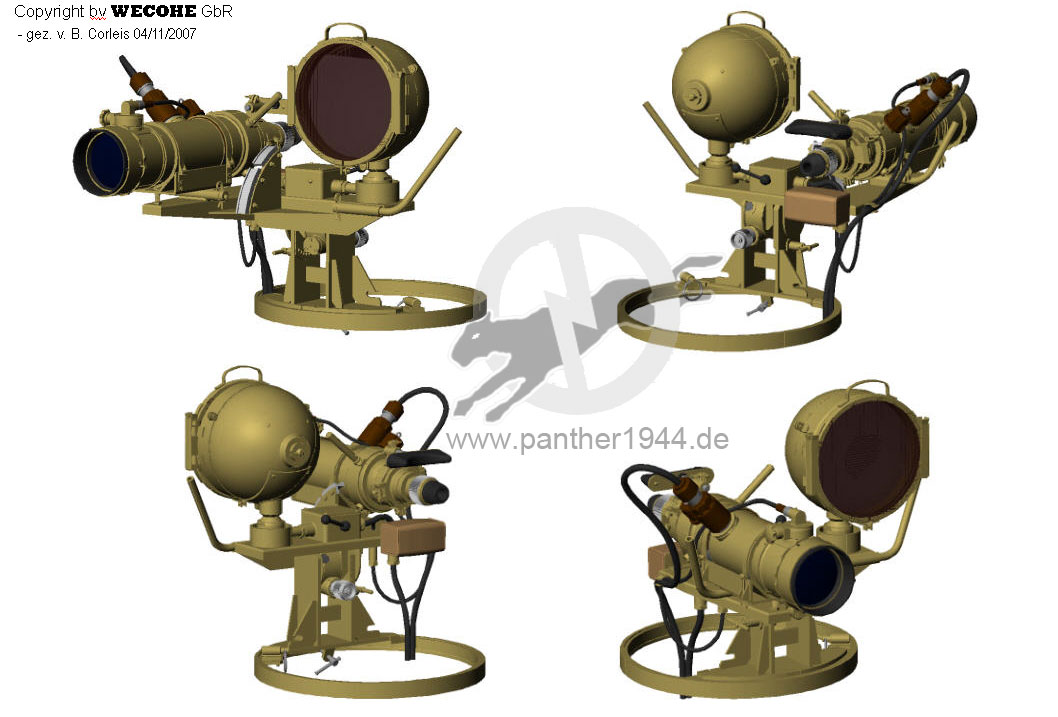


Panther Ausf G Système Sperber Koblenz
English Translation
Merci à Thomas Hartwig pour les photographies
 |
Historique Voir ICI
History Click HERE
Merci aux Red Devils pour le prêt des photographies
 |
Historique Voir ICI
History Click HERE
Texte from this Website
Traduction
Les nformations sur l'utilisation des appareils à infrarouge par la Wehrmacht est très limitée. Toutefois il est prouvé que des Panthers ont été équipés de ce système d'observation infrarouge. Un de ces dispositifs peut être vu à Coblence , en Allemagne, au Wehrtechnische Studiensammlung
Les tests sur des chars Panther ont été menés en 1943 sur des chars envoyés à Fallingbostel par la Panzerschule avec le FG 1250 ( Fahrgerät 1250) - .
leFG 1250 se composait d' un projecteur et d'un convertisseur d'image infrarouge ( Bildwandler = Biwa ) , l'association prend le nom de FG 1250 et aussi Puma
C'est une une petite plate-forme montée à l'intérieur du commandants coupole dirigée à 12 heurs (droit devant ). Le dispositif IR a été monté sur l'indicateur de position de la tourelle à l'intérieur de la coupole du cehf de char et peut pivoter à 360 degrés. Un projecteur 20cm ( 200W ) a été monté à coté du Biwa. L'alimentation est assurée par une batterie de 12 volts supplémentaire , qui a été alimenté par un transformateur. La charge de la batterie étant effectué par un générateur .
Avec cette l'installation on codamne la soute à munitio du compartiment de combat arrière droit . En outre, la boîte de rangement arrière droit est remplacé et une boîte de rangement blindée servant a stocker le matériel IR.
Le commandant dirige le pilote et le tireur en utilisant le dispositif IR .
C'est un système assez rudimentaire mais qui exige beaucoup de formation. La portée effective du système est d'environ 500-600 mètres. Bien sûr, cela diminue d'autant la portée au canon 7,5 cm de KwK L/70 du char Pour pallier à ce probleme , les Panthers manoeuvrent en liaison avec des semir chenille SdKfz 251/20 " UHU " ( hibou ) qui possède un projecteur de 60 cm -IR ( ces projectgeurs sont des anciens projecteurs anti-aériens recyclés ) .
Utilisation au combat
Apparemment, le 3. Kompanie 1./Pz.Rgt . 24 est envoyée à Bergen pour la formation. Des coups au but sont possibles jusqu'à des distances de 2500 mètres !
Au début de 1945, un char Panther avec dispositif SPERBER est envoyé au front à Stuhlweissenburg avec un" UHU "
Ces véhicules ont été accompagnées par SdKfz 251 equipé de dispositifs « FALKE " . Ils sont équipés d'un dispositif IR pour le conducteur pour assurer leur capacité de combat de nuit .
La combinaison fonctionne très bien .
Dés Aout 1944 un ordre du OKH stipule que les Panthers G doivent être équipés de la FG 1250 en usine , mais en raison de retards dans la livraison des Fahrgerät seulement 20 Panthers peuvent être livrés en Octobre 1944.
En Novembre 1944 l'OKH ordonne que tous les Panther équipés avec les appareils à infrarouge devaient être reconvertis à la norme Ausf G sans IR .
Les Panther recevant l'es IR doivent être désignés Ausf
Le 3. Kompanie est ensujite envoyée en Hongrie mais sans équipement infrarouge ! nous ne savons pas pourquoi elle part sas ses equipements IR
Au début de 1945, la Panzer Division " Clausewitz " combat dans la région de Fallersleben avec surement 2 Panthers équipés du dispositif " SPERBER ". le 21Avril 21 à 02:00 heures du matin 2 canons anti chars sont détruits par les Panther
Mais les temoignages ne semblent pas rapporter que des systèmes IR aient été utilisés par la la PZ division Clausewitz " car officiellement elle n'en a jamais été équipée.
Le 12 février 1945, la 1e. Kp / 101 PzAbtl de la Führer-Grenadier-Division a été désignée par le " Generalinspekteur der Panzertruppen " pour réaliser des expériences avec le FG 1250 .
Daimler -Benz a été chargé d' envoyer une équipe d' ingénieur à Altengrabow pour le montage des FG 1250 sur dix Panthers
En outre,3 Sd.Kfz. 251/20 " UHU " lui sont affectés
Les rapports témoignent de la réussite de cette manoeuvre.
I. / Pz.Rgt. 6 (3. PD) 1e Mars 1945 10 vehicles
Ausbildungs-Lehrgang Fallingbostel 16 Mars 1945 4 vehicles
I. / Pz.Rgt. 130 (25. PD) 23 Mars 1945 10 vehicles
I. / Pz.Rgt. 29 (PD Müncheberg) 5 Avril 1945 10 vehicles
4. Kp / Pz.Rgt. 11 (independent) 8 Avril 1945 10 vehicles
Toutes les unités, à l' exception de la „Ausbildungs-Lehrgang Fallingbostel“ seront deployées sur le Front de l'Est
.
 |
Information about the use of IR devices in the Wehrmacht is very limited. But as a fact Panthers were fitted out with infrared observing equipment. One of these devices can be seen in Koblenz, Germany, at the Wehrtechnische Studiensammlung (Defense Technical Study Collection) for example.Initial tests using infrared equipment on the Panthers were conducted in the late period of 1943.Panther tanks were sent to Fallingbostel to the Panzerschule to have the FG 1250 tested.
It consisted of a searchlight and an infrared image converter (Bildwandler=BiWa), the combination had the designation FG 1250 (Fahrgerät 1250) - German code name "Puma".There was a small platform mounted in the 12 o'clock position inside the commanders cupola. The IR device was mounted on the turret position indicator within the commanders cupola and could therefore be rotated 360 degrees . A 20cm spotlight (200W) was mounted on the indicator and a BiWa was installed. The power supply was ensured by an additional 12-volt battery, which was fed from a transformer. The charging of the battery was carried out by a generator. For the installation of both devices, the ammunition bin was dropped at the back right fighting compartment. Furthermore the right rear storage box was replaced and an armoured stow box for the device was mounted. The commander directed the driver and gunner using the IR device. Overall, a very primative method, which required a lot of training. The effective range of the system was about 500-600 meters. Of course this diminished the range of the excellent 7.5-cm-KwK L/70.
From the production at MNH it is known that in August 1944 the Panthers should be equipped with the F.G. 1250 already ex works. Due to delays in delivery with the Fahrgerät only 20 Panthers could be fitted out by October 1944. In November 1944 OKH issued an order stating that all panthers that had been fitted with the IR devices up to that point should have them removed and be converted back to standard Ausf G panthers.
Panthers from the Ausf G production run that had been prepared for mounting of the IR equipment were denoted by an "F" in the last position on the chassis number. These vehicles will have chassis numbers that fit within the range of the Ausf G production run and should not in any way be confused with the Panther Ausf F.
Because of this, the Panthers were supported in target reconnaissance with "UHU" (owl) - equipment, a 60-cm-IR light (converted from anti-aircraft searchlights) on Sd.Kfz. 251 (Sd.Kfz. 251/20). Apparently the 3. Kompanie 1./Pz.Rgt. 24 with the A solution was sent to Bergen for training. Reported hits have been achieved up to distances of 2500 meters!
At the beginning of 1945 a panther with SPERBER device should have been sent to the front at Stuhlweissenburg. Mostlikely it has been deployed in combination with an "UHU" on Sd.Kfz. 251. These vehicles were accompanied by so-called "FALKE" devices. These were IFV (Sd.Kfz. 251) equipped with an IR device for the driver to ensure their night-fighting capability. The use of combined arms has, according to reports in this context, works very well.
The 3. Kompanie was then ordered to Hungary under the battalion without infrared equipment! The reason why the equipment had to remain in Fallingbostel, is not known.
Also at the beginning of 1945, the Panzer Division "Clausewitz" fought in the area of Fallersleben. Reputedly 2 Panthers been equipped with the "SPERBER" device and on April, 21 at 02:00 o’clock two AT-guns were knocked out by the Panthers. The story seems doubtful and newer sources affirm this combat but without IR-equipment. Above all “Clausewitz” never had IR-equipment officially.
On February 12th 1945 the 1. Kp / PzAbtl 101 from Führer-Grenadier-Division was ordered by the “Generalinspekteur der Panzertruppen“ to carry out experiments with the F.G. 1250. Daimler-Benz was instructed to send an engineer team to Altengrabow to mount F.G. 1250 on ten Panthers there. In addition, the Company got 3 Sd.Kfz. 251/20 "UHU" assigned. Reports from officers of the company, give evidence of successful deployment of the devices without technical problems.
I. / Pz.Rgt. 6 (3. PD) on March 1st ´45 10 vehicles
Ausbildungs-Lehrgang Fallingbostel on March 16th ´45 4 vehicles
I. / Pz.Rgt. 130 (25. PD) on March 23th ´45 10 vehicles
I. / Pz.Rgt. 29 (PD Müncheberg) on April 5th ´45 10 vehicles
4. Kp / Pz.Rgt. 11 (independent) on April 8th ´45 10 vehicles
All units, except the „Ausbildungs-Lehrgang Fallingbostel“ were deployed at the eastern front. The Panther Ausf. F finally was designed to be fitted out with the F.G. 1250 from the beginni